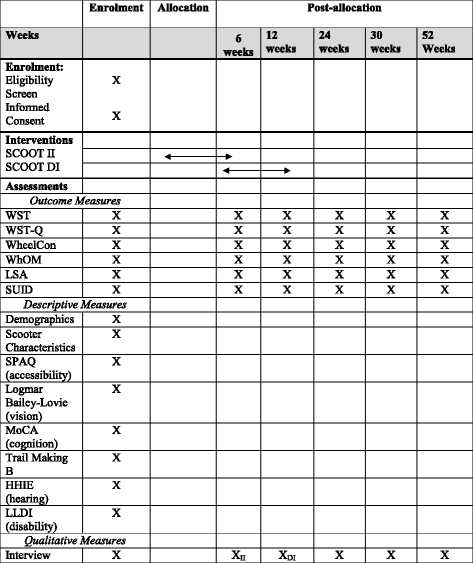Feasibility of a Systematic, Comprehensive, One-to-One Training (SCOOT) program for new scooter users: study protocol for a randomized control trial
- PMID: 28545498
- PMCID: PMC5445361
- DOI: 10.1186/s13063-017-1963-y
Feasibility of a Systematic, Comprehensive, One-to-One Training (SCOOT) program for new scooter users: study protocol for a randomized control trial
Abstract
Background: Mobility scooters can facilitate community participation among individuals with mobility limitations. However, accidents are a serious concern with scooter use. Scooter training has been recommended to improve safety, but there are currently few validated programs available. Therefore, we developed a Systematic, Comprehensive, One-to-One Training (SCOOT) program for scooter users. We will conduct a study to evaluate the outcomes produced by the provision SCOOT.
Methods: This feasibility study will use a mixed-methods, rater-blinded, randomized control trial, with a two-step wedge design. The study has two arms: an immediate intervention group, which will receive the intervention directly after baseline assessments, and a delayed intervention group, which will receive the intervention after a 6-week period. Forty participants, who will be stratified based on whether or not participants have previously held a driver's license, will be randomly assigned to each arm. The intervention for this study consists of 6 weeks of one-to-one scooter training by an experienced occupational therapist, who will provide training once or twice per week over the 6 weeks. The primary outcome measure is subjective scooter skills, measured using the Wheelchair Skills Test for scooters. Secondary outcomes include objective scooter skills, confidence, mobility, and satisfaction with selected participation activities. Descriptive measures include cognitive status, functional status, hearing, vision, physical accessibility of the home and community, and visual attention and task switching. Qualitative interviews will be conducted with the first ten willing participants from each group to learn about their scooter use and experiences with SCOOT.
Discussion: The results of this study will inform a larger randomized control trial. If the intervention is proven to be effective in this larger study, it may have important implications for policy and practice.
Trial registration: ClinicalTrials.gov identifier: NCT02696213 . Registered on 23 February 2016.
Keywords: Learning; Randomized control trial; Scooter; Training.
Figures

Similar articles
-
Validation of an individualized reduction of falls intervention program among wheelchair and scooter users with multiple sclerosis.Medicine (Baltimore). 2019 May;98(19):e15418. doi: 10.1097/MD.0000000000015418. Medicine (Baltimore). 2019. PMID: 31083170 Free PMC article.
-
Feasibility of the Enhancing Participation In the Community by improving Wheelchair Skills (EPIC Wheels) program: study protocol for a randomized controlled trial.Trials. 2013 Oct 24;14:350. doi: 10.1186/1745-6215-14-350. Trials. 2013. PMID: 24156396 Free PMC article. Clinical Trial.
-
Qualitative experiences of new motorised mobility scooter users relevant to their scooter skills: a secondary analysis.Disabil Rehabil Assist Technol. 2023 Jan;18(1):89-96. doi: 10.1080/17483107.2022.2063422. Epub 2022 Apr 20. Disabil Rehabil Assist Technol. 2023. PMID: 35442822 Clinical Trial.
-
Scoping review of mobility scooter-related research studies.J Rehabil Res Dev. 2016;53(5):531-540. doi: 10.1682/JRRD.2015.05.0084. J Rehabil Res Dev. 2016. PMID: 27898156
-
Motorized mobility scooters: the use of training/intervention and technology for improving driving skills in aging adults - a mini-review.Gerontology. 2014;60(4):357-65. doi: 10.1159/000356766. Epub 2014 Jan 24. Gerontology. 2014. PMID: 24481257 Free PMC article. Review.
Cited by
-
Interventions to improve outdoor mobility among people living with disabilities: A systematic review.Campbell Syst Rev. 2024 Jun 14;20(2):e1407. doi: 10.1002/cl2.1407. eCollection 2024 Jun. Campbell Syst Rev. 2024. PMID: 38882933 Free PMC article. Review.
-
Estimation of Steering and Throttle Angles of a Motorized Mobility Scooter with Inertial Measurement Units for Continuous Quantification of Driving Operation.Sensors (Basel). 2022 Apr 20;22(9):3161. doi: 10.3390/s22093161. Sensors (Basel). 2022. PMID: 35590851 Free PMC article.
References
-
- Centers for Medicare and Medicaid Services. Medicare Announces New Initiatives on Power Wheelchair Coverage and Payment Policy. 2004. https://www.cms.gov/Newsroom/MediaReleaseDatabase/Press-Releases/2004-Pr.... Accessed 18 Mar 2016.
-
- Australian Competition and Consumer Commission, NRMA Motoring & Services, CHOICE, EnableNSW & Flinders University. Mobility Scooter Usage and Safety Survey Report, 2012. 2012. Retrieved from https://www.mynrma.com.au/media/scooter_usage_26_safety_report_2012.pdf. Accessed 11 Mar 2016.
Publication types
MeSH terms
Associated data
Grants and funding
LinkOut - more resources
Full Text Sources
Other Literature Sources
Medical

